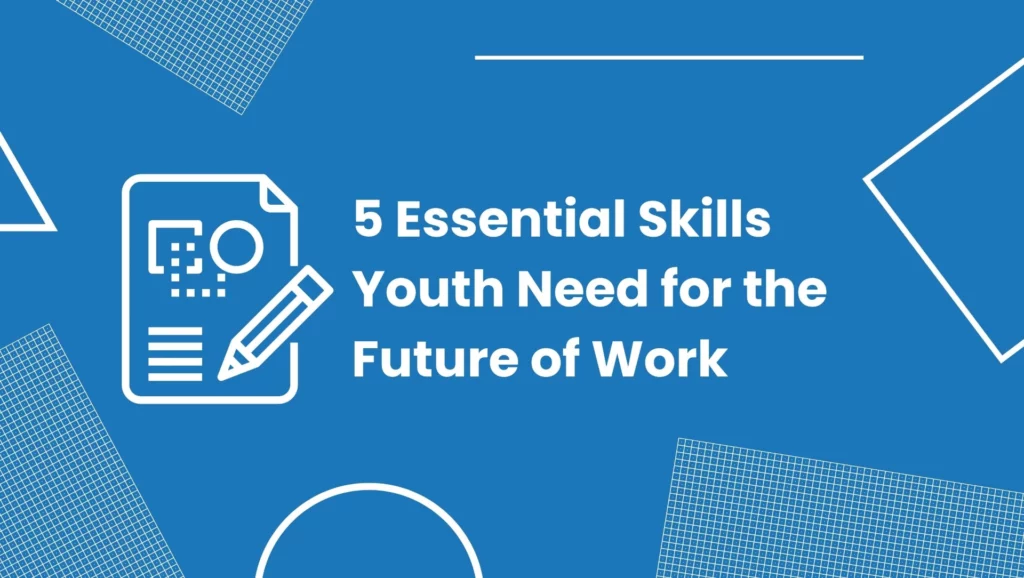Experts say that the future of work will require a broader range of skill sets due to factors like new emerging digital skills and increasing automation of jobs. Youth will transition into an uncertain, turbulent job market characterized by rapid technological change and a subsequent rapid change in employment expectations. As a result, we need to prepare our youth with a diverse set of tools, providing them with the most relevant but versatile learning experiences that will equip them with the future-proof knowledge and skills needed in tomorrow’s workforce.
But which diverse skills do young people need in their future-proof toolkit?
A young person’s ideal diverse skill set will likely demand the following hard and soft skills for the future of work:
1. DIGITAL SKILLS
It is unlikely that the future of work will not require skills such as digital literacy from emerging young workers. Daily functioning and work operations are dependent on digital skills today. Even in non-tech jobs, workplaces are making use of different computer operating systems as an essential part of work tasks and project management.
Still, there are existing digital skills gaps, even for ‘digital natives,’ which indicates that the youth of today should focus on attaining a stronger digital literacy for the future of work. Moreover, an important part of digital literacy is the ability to understand existing technology and use that knowledge to quickly learn new technologies. As such, it is integral that future workers become very confident in their digital literacy to prepare for the technologies yet to emerge.
2. EMOTIONAL INTELLIGENCE
Something that cannot be replaced by automation is emotional intelligence, which requires a deep understanding and observation of human behaviors, feelings, thoughts, and words. Emotional intelligence is invaluable in the workplace for resolving conflict, working harmoniously with team members, leading a team, and listening to others’ needs, ideas, and more. One of the most in-demand soft skills today is emotional intelligence. Youth today should focus on strengthening their emotional intelligence by way of experiential learning, collaborating with others, and learning more about others and themselves in order to apply this soft skill in the workplace.
3. PROBLEM-SOLVING
Another essential future-proof skill to have in the diverse youth skill set is problem-solving. The ability to observe, interpret, and analyze situations in order to create feasible solutions is invaluable for dealing with complicated workplace-related issues and conflicts, which may include interpersonal workplace problems along with task-related problems. This skill requires strong critical thinking and often creativity, too, which automated machines cannot replicate in the same way a human would.
4. INNOVATION
Some experts say that innovation is the future of work. To propel positive change forward, employers need future-oriented innovative thinkers on their team. Candidates who can demonstrate innovation contribute original, creative ideas for a company’s growth and success. The potential of an innovative employee is limitless, as they provide a resource for new, productive, and better ideas, plans, and systems to implement in the workplace. As such, youth should consider their innovation skills and discover ways to strengthen their innovation, like through open innovation challenges or experiential learning opportunities.
5. ADAPTABILITY
Lastly, adaptability is essential. The future of work will be different from today’s workforce. Youth can prepare themselves for change by learning how to learn — that is to say, young people, can discover and implement their most effective methods of learning in order to adapt quickly to new systems, technologies, and ideas in the future workplace. Moreover, the soft skill of adaptability can be attained through work experiences, in which the worker can practice being adaptable by dealing with situations of change or conflict. Employers are looking for workers who are open to the future’s change and uncertainty so that their company as a whole can effectively adapt to the changing times.
For the future of work, youth and students will likely require a diversity of hard and soft skills. As of today, some of the most relevant and in-demand affinities include digital skills, emotional intelligence, problem-solving, innovation, and adaptability. All of these are likely to stand the test of time. If youth are given the right opportunities to grow and develop, like in work-integrated learning (WIL) environments, they can build successful, fulfilling career paths with such a future-proof skillset.

